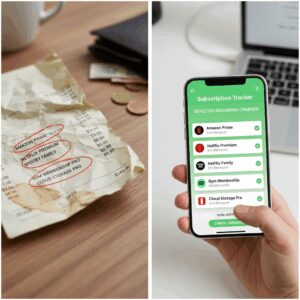
Managing your finances can often feel overwhelming, especially if you’re just starting out. However, budgeting doesn’t have to be a complicated or stressful process. With the right approach, you can keep your finances in check with minimal effort and ensure you’re making the most of your money. This guide will walk you through the basics of budgeting for beginners, offering practical tips to help you stay on track and achieve your financial goals.
Understanding Budgeting
Budgeting is the process of creating a plan to manage your income and expenses. It helps you allocate your money effectively, ensuring you have enough for your needs, wants, savings, and financial goals. A budget provides a clear picture of your financial situation and empowers you to make informed decisions about your spending and saving.
Benefits of Budgeting
- Financial Awareness: Budgeting helps you understand where your money goes and how you can better manage it.
- Control Over Finances: A budget puts you in control of your money, reducing the risk of overspending and debt.
- Savings and Investment: Budgeting allows you to allocate funds for savings and investments, helping you build wealth over time.
- Stress Reduction: Knowing you have a plan for your finances can significantly reduce financial stress and anxiety.
Steps to Create a Budget
1. Assess Your Financial Situation
Start by evaluating your current financial situation. Gather all your financial documents, including bank statements, bills, pay stubs, and any other sources of income and expenses. This will give you a clear picture of your earnings and spending habits.
2. Set Financial Goals
Identify your short-term and long-term financial goals. These could include:
- Paying off debt
- Building an emergency fund
- Saving for a vacation
- Investing for retirement
- Purchasing a home
Having clear goals will motivate you to stick to your budget and make necessary adjustments.
3. Calculate Your Income
Determine your total monthly income. Include all sources of income, such as:
- Salary or wages
- Freelance or side hustle earnings
- Rental income
- Investments and dividends
Use your net income (after taxes) to ensure you’re budgeting with the money you actually have available.
4. Track Your Expenses
Record all your monthly expenses. Categorize them into fixed and variable expenses:
- Fixed Expenses: Rent/mortgage, utilities, insurance, loan payments, subscriptions
- Variable Expenses: Groceries, dining out, entertainment, transportation, clothing
Tracking your expenses helps you see where your money is going and identify areas where you can cut back.
5. Create a Budget Plan
Now that you have a clear understanding of your income and expenses, it’s time to create a budget plan. Use the 50/30/20 rule as a guideline:
- 50% for Needs: Allocate 50% of your income to essential expenses like housing, utilities, groceries, and transportation.
- 30% for Wants: Reserve 30% for discretionary spending on things like dining out, hobbies, and entertainment.
- 20% for Savings and Debt Repayment: Dedicate 20% to savings, investments, and paying off debt.
Adjust these percentages based on your personal financial situation and goals.
Tips for Successful Budgeting
1. Use Budgeting Tools
Leverage budgeting tools and apps to simplify the process. Popular options include:
- Mint: Tracks your spending, creates budgets, and offers financial insights.
- YNAB (You Need A Budget): Focuses on proactive budgeting and goal setting.
- PocketGuard: Helps you control your spending and find opportunities to save.
These tools automate much of the budgeting process, making it easier to stay on track.
2. Automate Savings
Set up automatic transfers to your savings account each month. This ensures you’re consistently saving without having to think about it. Treat your savings like a regular expense to prioritize building your financial cushion.
3. Review and Adjust Regularly
Your financial situation and goals may change over time. Review your budget regularly to ensure it still aligns with your needs and make adjustments as necessary. This will help you stay flexible and responsive to any changes in your income or expenses.
4. Cut Unnecessary Expenses
Identify areas where you can reduce spending. Some simple ways to cut costs include:
- Cooking at home instead of dining out
- Canceling unused subscriptions or memberships
- Shopping for deals and discounts
- Reducing energy consumption to lower utility bills
Small changes can add up to significant savings over time.
5. Plan for Unexpected Expenses
Life is unpredictable, and unexpected expenses can arise. Build an emergency fund to cover unforeseen costs like medical bills, car repairs, or job loss. Aim to save three to six months’ worth of living expenses in your emergency fund.
6. Avoid Impulse Purchases
Impulse purchases can quickly derail your budget. Practice mindful spending by:
- Waiting 24 hours before making non-essential purchases
- Creating a shopping list and sticking to it
- Unsubscribing from promotional emails to reduce temptation
Being intentional with your spending helps you stay within your budget and avoid unnecessary expenses.
Common Budgeting Mistakes to Avoid
1. Not Tracking All Expenses
Failing to track all your expenses can lead to inaccurate budgeting. Be diligent in recording every expense, no matter how small, to get a complete picture of your spending.
2. Setting Unrealistic Goals
Setting unattainable financial goals can lead to frustration and burnout. Be realistic with your goals and timelines, and celebrate small milestones along the way.
3. Ignoring Irregular Expenses
Don’t forget to account for irregular expenses like annual insurance premiums, holidays, or home maintenance costs. Set aside a portion of your budget each month to cover these occasional expenses.
4. Not Adjusting for Changes
Life circumstances change, and so should your budget. Regularly review and adjust your budget to reflect changes in your income, expenses, or financial goals.
Budgeting is a powerful tool that can help you manage your finances, reduce stress, and achieve your financial goals. By understanding the basics of budgeting, setting clear goals, and tracking your income and expenses, you can create a budget that works for you. Use budgeting tools, automate savings, and regularly review your budget to stay on track. Avoid common mistakes and practice mindful spending to keep your finances in check with minimal effort. With these tips, you’ll be well-equipped to take control of your financial future and enjoy the peace of mind that comes with financial stability.
Unlock Full Article
Watch a quick video to get instant access.









